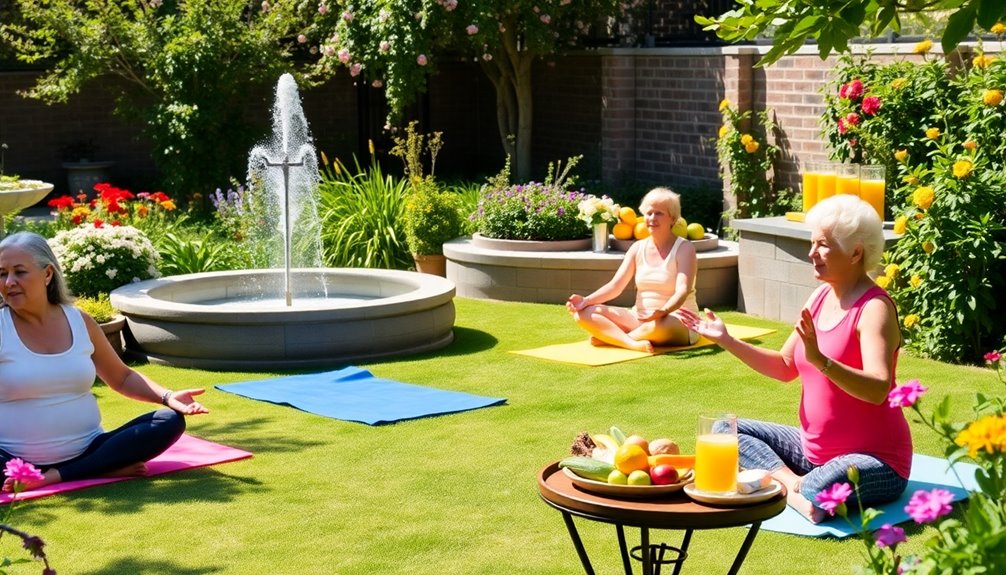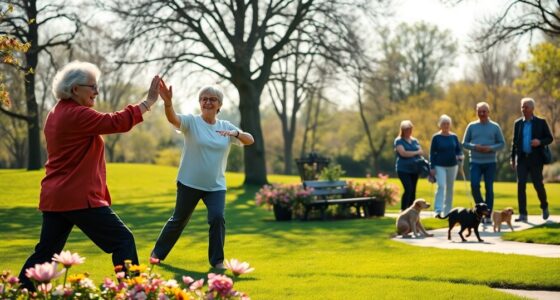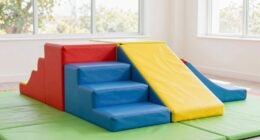To elevate your senior living experience, challenge your brain with puzzles and learning new skills like languages or instruments. Eat a balanced diet rich in fruits, vegetables, and omega-3 fatty acids. Protect your skin from the sun and prioritize quality sleep. Stay physically active with enjoyable exercises and foster social connections through clubs or community activities. Practice relaxation techniques to reduce stress. Embrace lifelong learning and volunteer opportunities for fulfillment. Discover more tips to enhance your well-being!
Key Takeaways
- Engage in brain-stimulating activities like puzzles and reading to enhance cognitive function and prevent decline.
- Maintain a balanced diet rich in fruits, vegetables, and omega-3 fatty acids for overall health.
- Participate in regular physical activity, including strength training and flexibility exercises, tailored to individual abilities.
- Foster social connections through community activities, clubs, and technology to enhance emotional well-being and cognitive health.
- Schedule regular health check-ups and manage chronic conditions to maintain optimal wellness and prevent complications.
Challenge Your Brain

As you age, it's crucial to keep your mind sharp, so challenging your brain with engaging activities can make a significant difference. Activities like puzzles, reading, and playing chess help prevent cognitive decline and boost mental wellness. Furthermore, learning new skills—like a language or musical instrument—can sharpen your thinking and enhance mental agility. Joining clubs or participating in community events fosters social interactions that further stimulate your mind. Engaging in insightful conversations gives you a chance to express your thoughts and share experiences, which is crucial for cognitive function. By regularly challenging your brain with new activities, you promote overall brain health and improve your quality of life. Additionally, emotional and psychological growth is influenced by continuous engagement in cognitive challenges, which can enhance your overall well-being. The practice of goal-setting can also provide direction and motivation, making your mental exercises more effective.
Moreover, staying informed about health issues, such as breast cancer symptoms, can empower you to take proactive measures in your overall health management. Prioritize these strategies for effective health and wellness as you age.
Eat a Balanced Diet

Eating a balanced diet is essential for maintaining your health as you age, since it guarantees your body gets the nutrients it needs. Focusing on nutrient-rich foods like fruits, vegetables, whole grains, lean proteins, and dairy can help you meet your changing nutritional needs. As you require fewer calories but more nutrient density, prioritize foods such as legumes, nuts, and fish. Incorporating omega-3 fatty acids from sources like salmon and walnuts can enhance your heart health and reduce inflammation. High-quality protein sources from lean meats and fish are also important for supporting overall health as you age. Engaging in regular physical activity, such as hula hooping for weight loss, can also contribute to overall wellness and weight management. Avoiding high-cholesterol and sugary foods is vital for minimizing the risk of chronic conditions, such as heart disease and diabetes. Additionally, establishing clear savings goals for your healthcare costs can provide financial peace of mind as you navigate your golden years.
Protect Your Skin

Taking care of your skin is essential as you age.
A good skincare routine, combined with regular sun protection, can help keep your skin healthy and vibrant. Additionally, hydration is important for maintaining skin elasticity and glow. Incorporating products with glycolic acid benefits can also enhance skin texture and promote a more youthful appearance. Regular use of glycolic acid products can lead to improved skin tone and clarity, making it a valuable addition to your skincare regimen.
Skincare Routine Essentials
While your skin may naturally change with age, establishing a solid skincare routine can greatly protect and enhance its health.
Prioritize gentle cleansing; use warm water and a soft cloth, then pat your skin dry before applying a fragrance-free moisturizer. This step helps retain moisture, essential for healthy aging, and can be complemented by incorporating chia seeds into your diet for added hydration benefits. Additionally, chia seeds are high in omega-3 fatty acids, which can support skin health.
Remember to wear gloves during gardening or household chores to shield your skin from irritants and environmental damage. Regularly moisturizing is important, as skin becomes thinner and more susceptible to harm over time.
Finally, when heading outdoors, apply broad-spectrum sunscreen with at least SPF 30 to protect against harmful UV rays. Meeting these skincare essentials not only supports your physical health but also aligns with your overall wellness needs. Additionally, maintaining good oral hygiene, including flossing for kids, can contribute to overall health and prevent complications as you age.
Sun Protection Measures
After establishing a solid skincare routine, it's important to focus on sun protection measures to further safeguard your skin. Seniors are more vulnerable to skin cancer and age-related issues, so using a broad-spectrum sunscreen with an SPF of at least 30 is essential.
Apply it generously to all exposed skin 15-30 minutes before heading outside. Don't forget to wear protective clothing like long-sleeved shirts and wide-brimmed hats to shield yourself from harmful UV rays. Sunglasses are also a must for eye protection. Additionally, consider using an air purifier to help reduce indoor allergens that can exacerbate skin sensitivity.
Regularly moisturizing your skin with fragrance-free products helps maintain hydration and combat dryness, especially after sun exposure.
Try to engage in outdoor activities during non-peak hours, typically between 10 a.m. and 4 p.m., to reduce the risk of sunburn. Additionally, be aware that UV rays penetrate clouds, meaning sunscreen is necessary even on overcast days.
Get Quality Sleep

Getting quality sleep is essential for your health and well-being.
By establishing a consistent sleep schedule, creating a restful bedroom environment, and avoiding sleep disruptors, you can greatly improve your nightly rest. Additionally, understanding the impact of financial considerations on stress levels can help you create a more peaceful sleeping atmosphere.
Incorporating home improvement strategies can also enhance the comfort of your sleeping space.
Let's explore how these simple changes can make a big difference in your sleep quality.
Sleep Schedule Consistency
Establishing a consistent sleep schedule can greatly improve your overall health and well-being as you age. Aim for seven to nine hours of sleep each night to enhance your cognitive function and stabilize your mood.
A regular bedtime routine signals your body that it's time to wind down, promoting better sleep quality and overall health. To support wellness for seniors, avoid stimulants like caffeine and electronic screens at least an hour before bed.
Consistent sleep patterns not only strengthen your immune function but also improve memory retention and reduce the risk of chronic health issues.
Restful Bedroom Environment
Creating a restful bedroom environment is essential for achieving quality sleep, especially as you age.
Start by maintaining a consistent sleep schedule, aiming for seven to nine hours each night. Low lighting and comfortable bedding can greatly enhance your sleep quality.
Minimize noise and consider keeping your bedroom cool, ideally between 60-67 degrees Fahrenheit, to promote better rest.
Avoid stimulants like caffeine and electronic screens before bedtime, as they can disrupt your ability to fall asleep.
Incorporating regular physical activity into your daily routine can help you fall asleep faster and enjoy deeper sleep cycles.
Avoid Sleep Disruptors
A restful bedroom environment sets the stage for quality sleep, but it's just as important to identify and avoid sleep disruptors that can interfere with your rest.
Here are three key strategies to enhance your sleep quality in your senior living community:
- Stick to a Schedule: Go to bed and wake up at the same time daily to help regulate your internal clock.
- Limit Screen Time: Avoid screens at least an hour before bed, as blue light can disrupt melatonin production.
- Mind Your Intake: Steer clear of caffeine and nicotine in the evening and practice relaxation techniques like deep breathing or gentle yoga before sleep.
Regular health screenings can also help identify issues affecting your sleep, ensuring you get the rest you need.
Get Moving
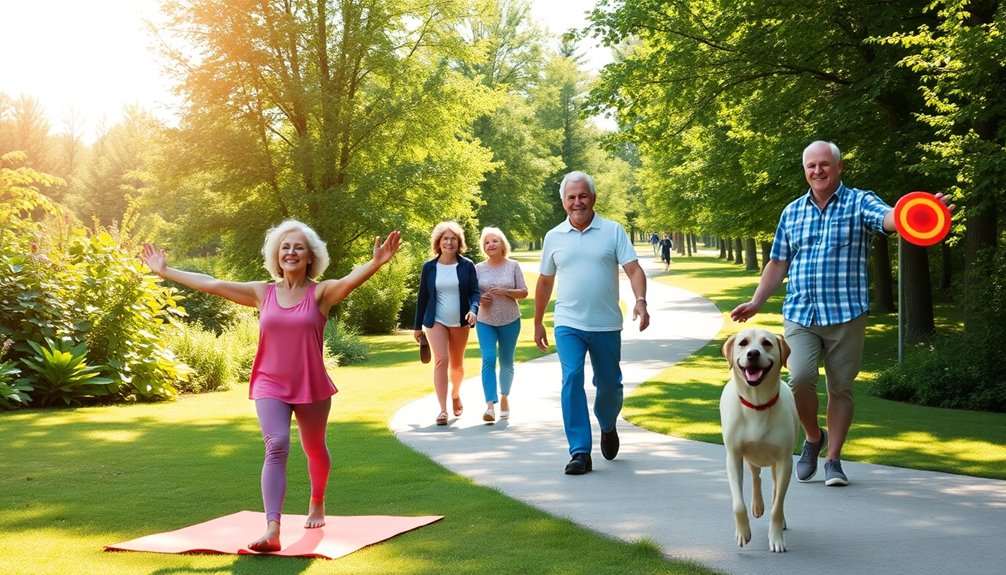
Moving regularly is essential for seniors looking to enhance their health and well-being. Staying active through moderate physical activity can markedly improve your cardiovascular health, flexibility, and overall mobility.
Incorporate exercises like brisk walking, swimming, and yoga several times a week to combat muscle loss and maintain strength. Studies show that staying active not only boosts your mood and energy but also helps alleviate symptoms of depression and anxiety.
Joining group activities or fitness classes can foster social connections, reducing feelings of loneliness and enhancing mental well-being.
If you're unsure where to start, consider consulting a fitness trainer to create a personalized exercise program that caters to your abilities and health issues, ensuring safe and effective workouts.
Get Regular Checkups

Getting regular checkups is essential for staying on top of your health.
Routine screenings help you monitor chronic conditions and guarantee your medications are effective.
Importance of Routine Screenings
While you may feel healthy, regular checkups are essential for detecting potential health issues before they become serious. Routine screenings can catch chronic conditions like diabetes and high blood pressure, which affect nearly 50% of seniors.
Annual cognitive health assessments are also vital, as about 1 in 9 adults over 65 face Alzheimer's or other dementias. Here's why you shouldn't skip those health screenings:
- Preventative screenings like mammograms and colonoscopies can lower cancer mortality rates by up to 20%.
- Regular checkups help adjust medications, minimizing adverse drug interactions.
- Vaccinations, including flu and pneumonia shots, protect against illnesses that may lead to hospitalization.
Stay proactive about your health—don't wait until problems arise!
Monitor Chronic Conditions Regularly
Regular checkups are essential for effectively managing chronic conditions like diabetes and high blood pressure, as they allow healthcare providers to monitor your health and make necessary adjustments.
For seniors, regular health screenings can facilitate early detection of potential issues, improving your overall well-being. Engaging in annual cognitive health assessments is equally important, helping identify risks of memory decline and dementia, which enables timely intervention.
Many senior living communities offer thorough health programs that include these regular check-ups, ensuring you receive necessary medical care without transportation hassles.
Stay Updated on Medications
Staying updated on your medications is essential for maintaining your health as a senior. Regular check-ups with your healthcare providers help monitor medication effectiveness and adjust dosages when needed. This proactive approach can prevent complications and side effects, ultimately helping you stay healthy.
Here are three key tips for effective medication management:
- Keep an Updated List: Maintain an accurate list of all your prescribed medications, dosages, and schedules to guarantee adherence.
- Communicate Changes: Inform your healthcare providers about any new symptoms or health changes that might affect your medication needs.
- Use Tools: Consider using pill organizers or medication management apps to avoid missed doses and ensure you're taking your medications correctly.
Stay Social

How can staying socially active transform your golden years? Engaging in social activities is essential for your well-being.
Studies show that socially active seniors experience 70% less cognitive decline compared to those who isolate themselves. By participating in clubs, volunteering, or group exercise within senior living communities, you can greatly boost your mood and cognitive function.
Regular interactions reduce stress and depression, leading to better mental health overall. Don't underestimate technology, either; video chats and social media help you stay connected with loved ones, even from a distance.
Embrace the organized events in your community to build friendships and strengthen ties. Staying healthy isn't just about physical fitness—it's about nurturing those important social connections, too!
Practice Relaxation
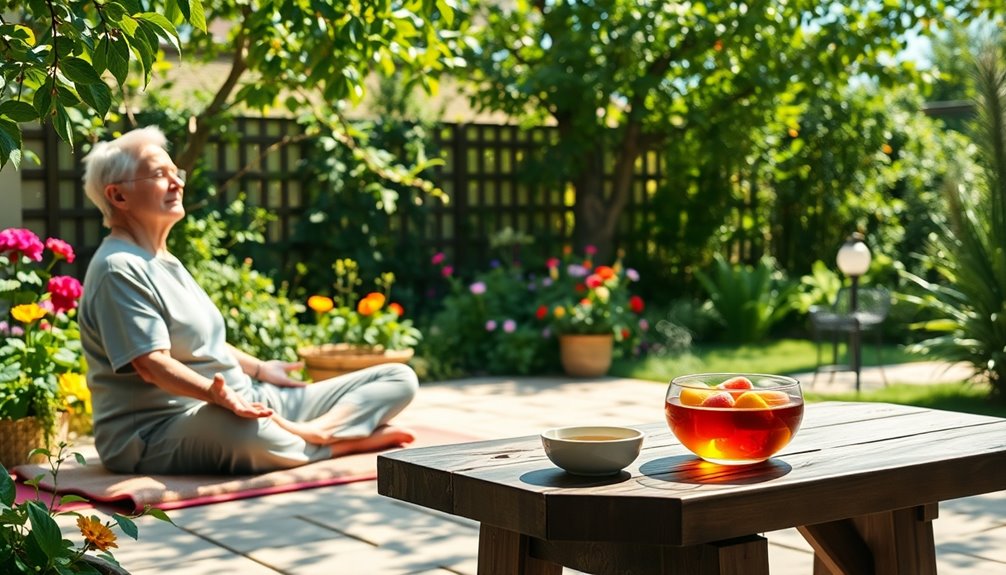
While life can often feel hectic, incorporating relaxation practices into your daily routine can make a significant difference in your overall well-being.
Regularly practicing relaxation techniques enhances mental well-being and emotional health, helping you feel more centered and less anxious.
Here are three effective ways to practice relaxation:
- Meditation: Spend a few minutes focusing on your breath to cultivate mindfulness and reduce stress.
- Gentle Yoga: Engage in slow, deliberate movements to ease tension and improve flexibility.
- Art Therapy: Explore painting or crafting to express your feelings and promote relaxation.
Integrating these practices can boost your immune system, improve focus, and lead to a greater sense of peace and contentment.
Make relaxation a crucial part of your wellness journey!
Engage in Lifelong Learning

Incorporating relaxation techniques into your routine sets a solid foundation for your mental health, but it doesn't stop there; engaging in lifelong learning is equally important for your well-being.
By participating in educational activities like literature or creative writing courses, you can enhance your cognitive function and memory, reducing age-related decline by up to 70%. These classes not only stimulate your mind but also spark new interests, fostering social interaction that boosts your emotional health.
Many senior communities offer tailored lifelong learning courses, ensuring you have access to resources that promote ongoing education and personal growth. Embrace this opportunity, and you'll likely find improved quality of life, curiosity, and a renewed sense of purpose.
Embrace Volunteer Opportunities

Volunteering can be a game-changer for seniors, offering numerous benefits that enhance both mental and emotional well-being. By engaging in volunteer opportunities, you can combat feelings of isolation and strengthen social connections, which is essential in senior living communities.
Plus, studies show that regular volunteering boosts mental health and life satisfaction.
Here are three ways to embrace volunteering:
- Join Structured Programs: Many senior living communities have organized volunteer initiatives, making it easy to get involved.
- Engage in Group Activities: Work with peers on community projects to build new friendships and networks.
- Challenge Your Mind: Volunteering often requires problem-solving and critical thinking, which can improve cognitive function and memory.
Embrace these opportunities for a fulfilling life!
Frequently Asked Questions
What Are the 8 Dimensions of Wellness for Seniors?
The eight dimensions of wellness for seniors include physical, emotional, social, intellectual, spiritual, environmental, occupational, and financial wellness.
You can focus on physical wellness by staying active and eating well. For emotional wellness, recognize your feelings and seek support when needed.
Build social connections to enhance relationships, and engage in lifelong learning for intellectual growth.
Don't forget about spiritual fulfillment, creating a comfortable living space, and managing your finances to guarantee stability.
How to Promote Healthy Living for the Older Person?
How can you promote healthy living for older adults?
Start by encouraging them to stay active with regular physical activities like walking or chair yoga.
Organize social events to foster connections, since engaging with others can markedly reduce cognitive decline.
Offer balanced meal plans rich in whole grains, lean proteins, and fruits.
Finally, provide lifelong learning opportunities to spark curiosity and enhance their quality of life.
It's all about creating a supportive environment for wellness!
What May Help Older Adults to Experience Better Health?
To help older adults experience better health, encourage them to stay active through regular physical activities like walking or chair yoga.
A balanced diet packed with fruits, vegetables, and lean proteins is essential too.
Social interactions are vital; participating in community events can combat loneliness and boost mental well-being.
Regular health check-ups allow for early detection of issues, and lifelong learning opportunities keep their minds engaged, enhancing their overall quality of life.
What Strategies Could Be Suggested for This Older Adult Couple to Enhance Their Quality of Life?
You can boost your couple's quality of life with simple strategies.
Start with social strolls and chair yoga to stay active and connected.
Nurture nutritious meals filled with fruits and veggies to fuel your bodies.
Engage in delightful hobbies or lifelong learning to keep your minds sharp and spirits high.
Don't forget regular health check-ups and medication management to guarantee you're on the right track for vibrant living together!
Conclusion
By embracing these health and wellness tips, you can paint a vibrant picture of your golden years. Imagine waking up refreshed, your mind sharp and your body energized, ready to explore the world around you. Picture yourself surrounded by friends, sharing laughter and stories, while your heart swells with joy from giving back to the community. This isn't just living; it's thriving. So take these steps today and watch your life bloom into a masterpiece of well-being!
